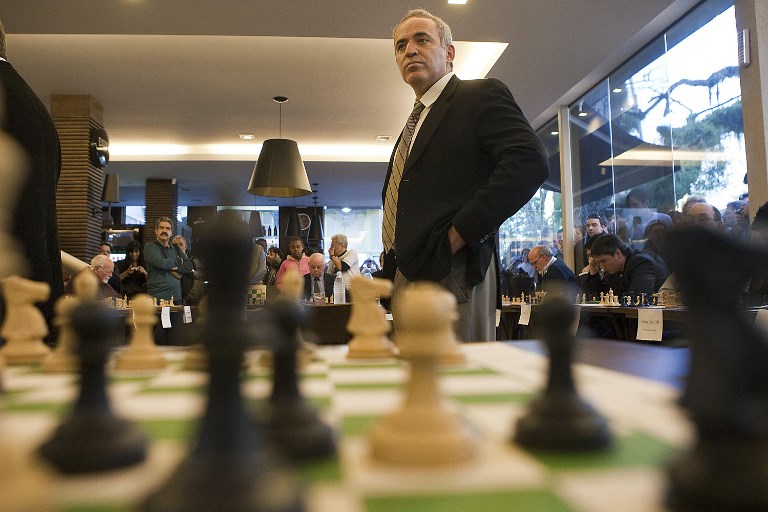‘Chess god’ Kasparov returns to compete 12 years later

This file photo taken on September 07, 2011, shows Chess grandmaster Garry Kasparov, playing simultaneous chess games in Porto Alegre, during his visit to Brazil. The former World Chess Champion and one of the leaders of Russian political opposition owned the game for 15 years, gaining superstar status among fans before retiring and throwing himself into politics. But he just can’t seem to stay away from the chessboard. The 54-year-old former world champion is coming out of retirement on August 14, 2017 to play in an official tournament in St. Louis, Missouri, against nine top-notch players. AFP FILE
LOUIS, United States — In a move electrifying the world of chess, former world champion Garry Kasparov is coming out of a 12-year retirement — if only briefly — to take on a new generation of players who have long worshipped him as the closest thing to a “chess god.”
Kasparov utterly dominated the sport from 1985 to 2000. Since his withdrawal from a tournament in Linares, Spain in March 2005, the Russian’s absence has left many chess fanatics feeling orphaned.
So there was considerable surprise when he agreed to play in the new Rapid and Blitz tournament in St. Louis, Missouri, which follows closely after the annual Sinquefield Cup competition, a major stop on the world tour, in the same city on the Mississippi River.
Kasparov, who became the youngest world champion ever at age 22 in 1985, is now 54, more than a decade past the age when professional chess players typically retire.
Indeed, in a Facebook posting early Sunday, he made clear that the Rapid and Blitz tournament represents “not an end to my retirement from chess, only a five-day hiatus.”
He added, “I have no plans to play after this event.”
From Monday to Saturday, the Russian will put aside the business that has kept him busy in retirement — his vocal and determined opposition to President Vladimir Putin — to play against some of chess’s big guns, like fellow Russian Sergey Karjakin.
The world’s current No. 1 player, Magnus Carlsen of Norway, will not be there, however.
Still, the return to competition of the Azerbaijan-born Kasparov — a man once dubbed the “Beast of Baku,” whose epic clashes with Anatoli Karpov are part of chess legend — has had an explosive impact in the chess world, particularly in St. Louis.
‘To see this dude play’
“Everyone is talking about it,” American chess grandmaster Alejandro Ramirez told AFP. “People are flying from India and China to see this dude play.”
Kasparov’s long and “unparalleled” dominance of the chess world made him “a cultural icon,” said Ramirez, a US Open champion who coaches the chess team at Saint Louis University.
The younger generation, which Ramirez sees emerging almost by the day, “certainly looks up to him,” he said. “His contribution to chess theory and our understanding of the game resonate still today.”
But what are Kasparov’s realistic chances after so many years away from the grueling competition of professional chess?
“Garry Kasparov has always had a fighting spirit second to none, and he is extremely competitive,” Ramirez said. “But he is still going to be facing very stiff competition,” including “some of the best of the best of the world.”
The man himself sought to “manage expectations,” quipping in his Facebook post Sunday that “at the age of 54 I would have as much hope of returning to my chess form of age 40 as to my hairline of age 20!”
The high-pressure, speed-chess format of the St. Louis tournament, where players are forced to make their moves far more rapidly than during normal competitions, could be tough on the graying Kasparov, as he takes on much younger players who specialize in that approach.
“I expect him to be fighting for the top spots, but I would be surprised if he wins it all,” said Ramirez, 29, who became a grandmaster at age 15.
His ‘incredible aura’
But in a tournament that will include four of the world’s top 10 players, Kasparov is not expected to be a pushover, said Sylvain Ravot of France, who has a master rating.
“His sense of the game, his passion for winning, his experience and his reflexes should all help him do well, perhaps even land in the top three, even if it will be much harder for him,” Ravot said in an interview, while emphasizing Kasparov’s “incredible aura.”
Accustomed to being a step ahead of the field, the Russian “chose the venue well — more or less within his reach — for his comeback,” Ravot said, adding that the mere fact of Kasparov’s return might be more important than his actual performance.
“It’s a bit like Pete Sampras making a comeback” to tennis, he said.
Kasparov would appear to be motivated more by love of the game than anything else. Though the winner’s purse in St. Louis is a not-paltry $150,000, the grandmaster said he would donate any winnings to promote chess in Africa.
Kasparov did in fact return to the game, though only in informal capacity, once before, in 2015. He played a friendly match against Nigel Short — 10 years after formally bowing out of professional competition.
Kasparov did not appear to have lost a step: He crushed his British opponent, 8 to 1. CBB